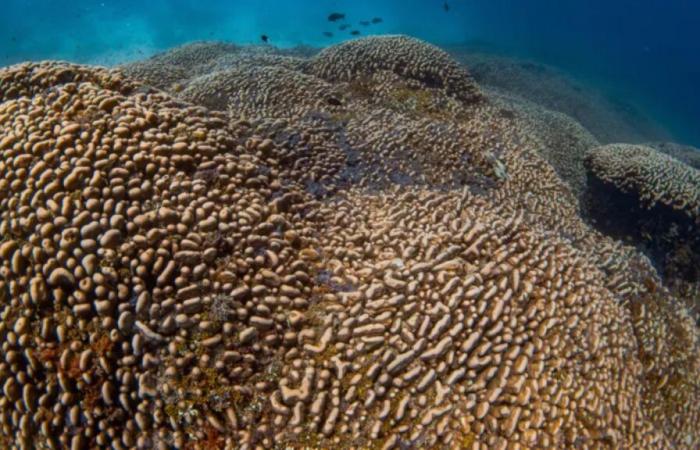An incredible find has just emerged from the depths of the sea, captivating scientists and environmentalists across the planet. To Solomon Islandsa coral organism of unprecedented size has been unearthed. This marvel not only fascinates with its impressive dimensions; it also poses serious questions about the capacity of reefs to resist current environmental challenges.
An unexpected encounter with a marine giant
This is thanks to a signed shipment Pristine Seas de National Geographic that this underwater behemoth was discovered. Under the watchful eye of the videographer Manu San Felixthe team was looking to explore an area listed as a wreck. By pure luck, they came across this gigantic organism, now recognized as the largest coral in the world.
This colossus belongs to the species Peacock nail and displays impressive measurements: 34 meters of large, 32 meters long and 5.5 meters high. It thus dethrones the previous record held by a coral from American Samoa with its 12 meters additional. Old about 300 ansthis giant was born during the Napoleonic era, testifying to extraordinary resistance in the face of environmental upheavals.
This imposing reef is made up of millions of small polyps forming a single, united organism. Its exceptional longevity, despite three centuries spent in a constantly evolving environment, is simply astonishing. As Manu San Félix puts it so well: “It’s crazy to see something so immense and old – around 300 years old – having gone through so many changes without flinching. »
Reefs are often harmed by high temperatures due to climate change, causing bleaching and mortality. In the shallow waters of the Solomon Islands, these reefs are also suffering the harmful effects of warming and pollution.
The race to save these natural wonders
The discovery of this enormous coral organism has boosted efforts to protect this precious region. Local tribes have called on the government to act to safeguard the waters around Malaulalo. During COP29, the climate minister, Trevor Manemahagahighlighted how reefs are vital to the national economy and ecology.
These reefs not only shelter abundant biodiversity but also protect the coasts against erosion while financially supporting millions of people. Faced with the threat weighing on these fragile ecosystems, it is becoming urgent to adopt sustainable practices in place of destructive methods such as deforestation.
A global issue that deserves our full attention
Coral reefs are essential for supporting rich biodiversity while providing natural protection from coastal storms. The urgency of the funding needed for their conservation is obvious as we face the inevitable effects of climate change.
This discovery not only arouses admiration but also pushes us to act quickly to preserve these priceless natural treasures. As Manu San Félix points out: “Seeing something so vast and ancient is inspiring. » As we continue to explore our oceans, it is crucial that these discoveries fuel our desire to protect our blue planet to ensure its sustainable future.
A reaction? Leave a comment
Did you like this article? Subscribe to our free newsletter for engaging articles, exclusive content and the latest news.






